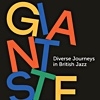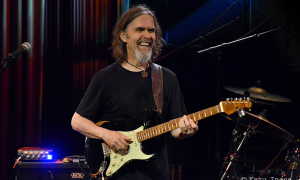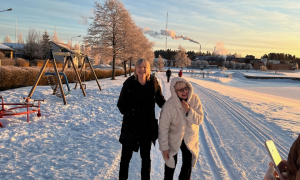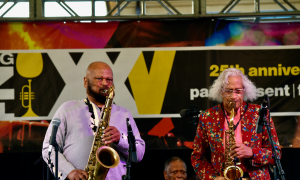Home » Jazz Articles » SoCal Jazz » John Patitucci: The Quintessence of Acoustic and Electric
John Patitucci: The Quintessence of Acoustic and Electric
JP: That's it exactly, Jimmie. It's so powerful from within, that it changed my whole style of playing back in the late eighties and early nineties when I first played with Wayne. This goes back before the other guys joined the band. Wayne and I would be playing the music from Atlantis (Columbia, 1985). He would solo and just kill you with three notes. He would play one of those monumental solos that was chiseled out of granite and I would just shake my head. He would turn to me and say, "Want some?" I'd be thinking the answer is no. I mean, how do you follow that? But he would encourage me with his, "go Paganini, go—go, Paganini, go." He enjoyed watching me fly around, but interestingly his music made me start to do the opposite. I started focusing more on every note, trying to find the one note that would make people emotional.
AAJ: Your relationship goes well beyond music, as Shorter is Uncle Wayne to both of your daughters.
JP: Yes, I met my wife right around the same time I started playing with Wayne. So my daughters grew up around him. He's Uncle Wayne, there's also Uncle Herbie, and there was Uncle Michael Brecker. Mike lived in the same town with us. He's the reason we moved to Hastings in lower Westchester.
AAJ: Is that right?
JP: Yeah, he used to live here, until he died. He was part of their life. Wayne and Herbie have always been a part of their life. Chick, too. I would take them on the road with me sometimes. Uncle Brian and Uncle Danilo are huge in the girls life. They have been around a lot of phenomenal musicians.
AAJ: It's interesting that they grew up in that environment as opposed to that not being the case when you were growing up.
JP: Yeah, it is. I had dreams of people that I looked up to from afar. But I wasn't hanging out with them (laughing).
AAJ: They weren't sitting at the dinner table.
JP: No, they sure weren't (laughing).
AAJ: In the absence of live gigs, you have been busy as always in the studio with several recording projects. Patitucci Colaiuta Cunliffe(Le Coq, 2020), and The Le Coq Jazz All-Stars(Le Coq, 2020) just to name a couple. Both of which are great records. The former being completely improvisational. I had a chance to talk to Bill Cunliffe about it and he was almost giddy about the experience of improvising with you and Vinnie.
JP You know, that was another situation where we had, in this case, a fair amount of studio time left. Piero Pata, the owner of Le Coq Records, suggested that the three of us go in and record as a trio. I was hesitant to do so. I am used to having more preparation and control of material on my recordings. Also, I have played with Vinnie a lot over the years but very little with Bill. But we ended up having a good time with it and it came out very well.
AAJ: Cunliffe related that there was no sheet music. That all the standards were played from memory. What could have been a train wreck became a highly improvisational record with you all paying a lot of attention to each other and reacting accordingly.
JP: Yeah, it turned into a one day session like back in the late fifties on Blue Note. I have to say that I really enjoyed all the time I spent out west recording for Le Coq. I got to see and play with many old friends that I hadn't seen in some time. John Beasley for example. We go way back. He used to play in my band. It was great to see John and so many others.
AAJ: You mentioned Berklee in regard to Sachi. What's the skinny on your continuum with the Berklee School of Music. I believe the position you are in was developed about ten years ago, designed for off-site instructors.
JP: Yes, I have been teaching there for ten years now. I was doing some teaching at The City College in New York City, but Danilo was after me to teach at Berklee. He said that he really needed me to be there. I had a fifteen minute drive to Harlem and only went in twice a week. So I told Danilo that I wasn't sure how that was going to work having to drive all the way to Berklee. So they call me a visiting scholar, which cracks me up because I don't even have a degree. I am a tenured professor. I spend four weeks with my students each semester. There's four visits, that I can work around my schedule. Four residencies each semester. Eight residencies a year. With that they take total care of me. I get the health insurance benefits and a very nice salary. That saved my family during the pandemic.
AAJ: Teaching has become a life saver for many musicians during the pandemic, just in the harsh realities of paying their rent and putting food on the table. You, on the other hand, have taught for many years. You would seem to believe quite strongly in giving back and passing down information to the next generations.
JP: Yeah, sacrificial giving and giving encouragement is part of my faith. I have a lot of gratitude for what happened to me, so mentorships are a way to help, and to pass on knowledge. There's a large void to fill and I think it's our obligation to take that on. In the past we had all these great band leaders that you could apprentice with. But they're all gone now. You used to be on the gigs playing with their bands. You'd be on The Crucible. We would be on a tour and have to step up to a new level of playing.
AAJ: Is the environment as much about teaching life skills, self disciplines, and self awareness, as it is about teaching chordal structures, harmonies, and rhythms?
JP: Yes, sure, it's about everything. The global institute at Berklee covers using music for social change, for service to people that don't have the same opportunities that we do. For years Danilo had a clinic in Panama. We would take our students down there and have them teaching underprivileged kids in Panama. Many of these kids were from like the hood, and their lives were transformed.
AAJ: So many just need an opportunity. It's really great that you took the time to do that. I very much thank you for your time this evening, John. It's been a real pleasure talking with you.
JP: Absolutely, Jimmie. I enjoyed it as well.
AAJ: We covered a lot of ground. I appreciate your candid and intelligent conversation. Hopefully you will have tours starting up in the near future and I can get out to a show.
JP: Let's hope so. Bye now, Jimmie. Take care.
Tags
SoCal Jazz
John Patitucci
Jim Worsley
United States
New York
New York City
Adam Cruz
David Perelas
Adam Rogers
Bud Powell
Chris Potter
John Cowherd
Nate Smith
The Meters
Miles Davis
Steve Cardenas
Jimi Hendrix
Earl "Fatha" Hines
Eubie Blake
Wes Montgomery
Art Blakey
Ron Carter
oscar peterson
Ray Brown
Sam Jones
John Entwistle
John Paul Jones
The Who
Led Zeppelin
jeff beck
Cream
Humble Pie
Paul McCartney
James Jamerson
Willie Weeks
Donny Hathaway
Chuck Rainey
Stevie Wonder
Chet Baker
Jay Anderson
Woody Herman
Gap Mangione
Victor Feldman
Lenny Breau
Joe Farrell
Freddie Hubbard
Dave Grusin
Chuck Mangione
Gayle Moran
Tom Brechtlein
Dave Weckl
Michael Brecker
Bob Berg
Gary Novak
Paul Jackson
the headhunters
Rocco Prestia
Larry Graham
Sly and The Family Stone
Graham Central Station
Marcus Gilmore
Andy James
Jim Morrison
Wayne Shorter
Danilo Perez
Bill Cunliffe
John Beasley
PREVIOUS / NEXT
Support All About Jazz
 All About Jazz has been a pillar of jazz since 1995, championing it as an art form and, more importantly, supporting the musicians who make it. Our enduring commitment has made "AAJ" one of the most culturally important websites of its kind, read by hundreds of thousands of fans, musicians and industry figures every month.
All About Jazz has been a pillar of jazz since 1995, championing it as an art form and, more importantly, supporting the musicians who make it. Our enduring commitment has made "AAJ" one of the most culturally important websites of its kind, read by hundreds of thousands of fans, musicians and industry figures every month.

























